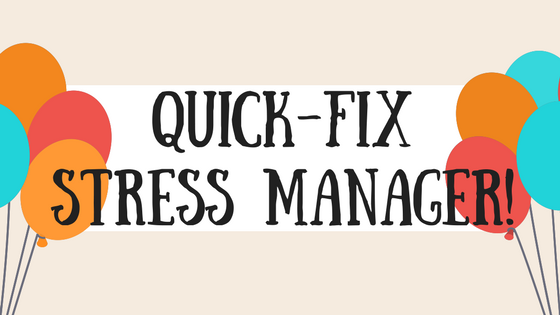Prefer to listen to this blog—while you drive, while you work, while you exercise, or even while you cook? Try this audio; it’s eyes and hands free! It’s only 6 1/2 minutes, but if you’d like to download an mp3 to load onto your phone, right-click control-click on the mac) HERE.
Let’s be honest—we all experience stress. We all experience problems. Some big, some not so big.

The big stuff:
A health issue that won’t go away.
That huge debt that keeps you tossing and turning at night, leaving you exhausted.
That deteriorating relationship. It’s been on a downward spiral for some time now. You need to make a decision soon.
That friend/partner/family member who is drinking again.
Politics.
The not so big stuff:
The noisy neighbor.
The barking dog.
The new person in your group who talks too much and is spoiling it for all of you.
That high school friend on Facebook with political views that are driving you crazy.
The weird thing is, the big things and the not so big things can be equally stressful. There’s no accounting for what causes us unhappiness. We can sometimes sail through major life changes, and fall apart when someone is rude to us.
Whatever it is, stress and worry can steal your energy and put you through an emotional wringer— leaving you unable to cope with everyday life.
Wouldn’t it be nice to have a way to deal with problems that dissolves the stress—even if it doesn’t necessarily dissolve the problem?
A way to handle stress that gives you a new point of view and sense of perspective?
Something, anything, that helps you cope? Feel more peaceful? And works immediately?
Good news! There is a way. I call it my Quick-Fix Stress Manager.
Let me share.
I first came across this set of 3 questions years ago, in the 1990s, when I was a hot-shot business trainer and this meme was making the rounds in training circles.
I remember going all cold with the ‘aha’ moment I experienced because of its simplicity and brilliance—as I was simultaneously overcome with jealousy that I hadn’t thought of it first. But I think the Buddha was first, and Seneca a few hundred years later. It sounds a lot like the Serenity Prayer written in 1951. Perhaps it’s always been around.
It’s simple, easy to remember; at the same time profound.
Here was something I could actually use—not just a clever sound-bite.
And definitely this was something that could help me with almost every problem I encountered. A true ‘across-the-board’ solution, kind of like an umbrella over anything in my life I found difficult to deal with.
Here we go:
The next time you are feeling anxiety, stress, worry or experiencing something disturbing, ask yourself these 3 questions:
1. Can I change it?
2. Can I accept it?
3. Can I walk away from it?
Note: You are working to find a yes somewhere here; otherwise you’re in for trouble. Expect to implode shortly.
Let’s look at this more closely:
1) Can I change it?
If you can change it, or at least do something about it, and it is somewhat under your control—take action. Any action. Then stop worrying about it. You are doing your best. Action is the absolute best stress reliever. Go on that march. Write that Senator. Donate. Make an appointment.
2) Can I accept it?
If you really cannot change it, and there is nothing you can do to affect the situation, can you accept it or resign yourself to it? Can you learn to live with it? If so, surrender to reality. You can’t change those election results. You can’t live that person’s life for them. Accept what is, and then let go the stress. Drop it now—it’s not serving any purpose.
3) Can I walk away from it?
If no to both of the first two questions, then the third option is —can you walk away from it? Get out, break off the relationship, move away, change jobs. You know that partnership is never going to work. You know you’ll never be happy living in Kansas. You can’t live with someone who is mentally ill if they won’t get treatment. Get out, now.
Walk away. You can’t change it and it will never be acceptable to you. It’s ok; you’re not a selfish monster, just realistic. You can always move to Antarctica.
Walking away can mean physically, as in leaving the scene, or emotionally and mentally. Sometimes we may not be able to move away or get on a plane, but we can just decide to switch off. It may be your only option for survival.
This Quick-fix Stress Management tool works for any issue or problem. It gives you a reframe, and a way to let go and move on.
These are your choices. You can work with 1, 2, or all 3.
If you can do all 3, then so much the better.
For instance, you can remove yourself from a nasty situation, and try your best to change it from a distance, at the same time accepting the reality of what is and feeling OK with it.
You may not be able to walk away from that health problem, but you can work to change it and accept what is at the same time.
You may not be able to walk away from that election result, (unless you unplug and become a hermit), but you can take what action you can, and accept what is, in the meantime.
You don’t have to like it, but if there is nothing you can do, you don’t have to let it ruin your life either.
The key is to let go of the worry and stress. Remember this: Nothing works well when you are stressed. Everything works better when you are calm.
You can’t argue with that. So make it your aim to let go of stress.
Try my Quick-Fix Stress Manager. I wish I had made it up. Really. I’d be a millionaire. So put it in your tool-box and use it next time you need it. And checks made out to Margaret Nash gratefully received…


